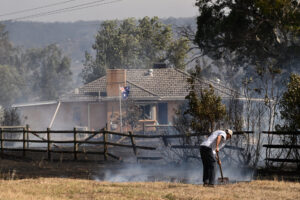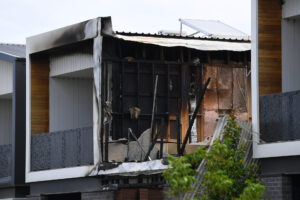Fossil fuels are gobbling up construction capacity and it’s hurting at home

In the wake of the Reserve Bank’s latest forecasts, Treasurer Jim Chalmers is facing calls that government should cut back on infrastructure investment to relieve inflation pressures and free up workers and resources to build much-needed housing.
Patricia Karvelas peppered the Treasurer with questions this morning, asking whether there is there anything the government can do to slow “non-essential projects” to “allow flow back to housing”.
The short answer is yes. There is one particular kind of infrastructure the government can cut back on first: fossil fuels.
Every time the government approves new coal mines or gas expansions, it’s giving the go ahead to projects that soak up labour and equipment — taking resources away from the construction of essential infrastructure like dwellings, roads, and railways.
Some $41 billion worth of new fossil fuel projects are gobbling up the construction supply chain.
Recent research by the Australia Institute using official government data has found that fossil fuel projects make up 53% of the total funding committed to resource and energy infrastructure across Australia.
Woodside, for example, has committed an estimated $18 billion to oil and gas projects in Western Australia; Santos $4.3 billion to the Barossa gas project in the NT. Further billions are flowing to coal projects in NSW and Queensland.

The scale of this fossil fuel expansion is enormous, and it becomes even more stark when we remember that state and federal governments subsidise fossil fuels to the tune of $14.5 billion a year.
Taxpayer money is funding private infrastructure that makes it harder to build public transport and housing. In the NT alone, the Commonwealth Government is spending $100 million on roads explicitly for the onshore gas industry.
Chalmers was at pains to suggest that his focus was “on building the houses and the infrastructure, not the houses or the infrastructure.” But the reality is that these builds have similar construction and engineering inputs to roads and railways. Every time a new coal mine or gas facility is built, it sucks labour and materials away from other infrastructure projects, which has a knock-on effect for housing construction. Economists call this the opportunity cost of fossil fuel expansion.
In short, Australia’s fossil fuel expansion is making it harder to upgrade necessary infrastructure and to build the homes and public transport we so desperately need.
And let’s not forget that approving new fossil fuel projects is at odds with advice from climate scientists and the International Energy Agency that to reach net zero emissions by mid-century and limit catastrophic climate change, there should be no new oil, coal or gas projects built.
The government estimates that at least 21,000 construction jobs will be needed for all the resource and energy projects currently at the “committed” stage of development. This amounts to 18% of Australia’s current Heavy and Civil Engineering Construction workforce.
Chalmers stressed the important work his government is doing to increase the size of the construction workforce. But that takes time, and time is of the essence in a housing and climate crisis. More workers for fossil fuel projects means less workers for roads, railways and housing, and the death of many Australians’ aspirations for a safe and affordable place to live.

Of course, it makes sense for the government to carefully assess infrastructure investments to make sure they are worthwhile and represent value for money, while eschewing boondoggles and pork-barreling.
Last year, the Albanese government dumped 50 projects that had been greenlit by its predecessor after an independent review found that cost blowouts of $33 billion, and shortages of workers and equipment, had resulted in a clogged infrastructure pipeline.
But if the government really wants to unclog the infrastructure pipeline and ease cost pressures, it could turn its attention to the fossil fuel projects that have bunged it up.
With a finite supply of workers and equipment, and a long queue of fossil fuel and transport projects, something has got to give.
Between the Lines Newsletter
The biggest stories and the best analysis from the team at the Australia Institute, delivered to your inbox every fortnight.
You might also like
Burning homes and rising premiums: why fossil fuel companies must pay the bill
Another summer, another round of devastation: homes lost, communities evacuated, lives upended.
Why a fossil fuel-free COP could put Australia’s bid over the edge
When the medical world hosts a conference on quitting smoking, they don’t invite Phillip Morris, or British American Tobacco along to help “be part of the solution”.
Pay a fortune in premiums or risk losing everything – the brutal reality of Australia’s insurance crisis
Struggling families who ditch their home and contents insurance would lose three-quarters of their wealth if their home was destroyed, according to new research by The Australia Institute.



